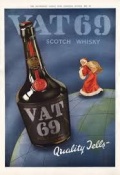Difference between revisions of "Pages 167-174"
m (→Page 167: Comment inserted) |
m (→page 171: inserted year) |
||
| Line 42: | Line 42: | ||
==page 171== | ==page 171== | ||
171.7 '''''Aberystwyth'''''<br> | 171.7 '''''Aberystwyth'''''<br> | ||
| − | A tune composed by Joseph Parry, often used in hymns; Aberystwyth is a city in Wales. | + | A tune composed by Joseph Parry in 1876, often used in hymns; Aberystwyth is a city in Wales. |
171.11 '''bubble-and-squeak'''<br> | 171.11 '''bubble-and-squeak'''<br> | ||
Revision as of 06:38, 11 June 2016
This page-by-page annotation is organized by sections, as delineated by the seven squares (sprockets) which separate each section. The page numbers for this page-by-page annotation are for the original Viking edition (760 pages). Editions by other publishers vary in pagination — the newer Penguin editions are 776 pages; the Bantam edition is 886 pages.
Contributors: Please use a 760-page edition (either the original Viking edition with the orange cover or the Penguin USA edition with the blue cover and rocket diagram — there are plenty on Ebay for around $10) or search the Google edition for the correct page number. Readers: To calculate the Bantam edition use this formula: Bantam page # x 1.165. Before p.50 it's about a page earlier; as you get later in the book, add a page.
Finally, profound thanks to Prof. Don Larsson for providing the foundation for this page-by-page annotation.
Page 167
167.36 "And the crowds they swarm in Knightsbridge, and the wireless carols drone, and the Underground's a mob-scene, but Pointsman's all alone" Sung to the tune of the Kinks' "A Well-Respected Man" ... "And he gets up in the morning, and he goes to work at 9, etc etc"]
Comment: interesting observation -- but is there more to corroborate this or is it just a coincidence (if coincidences exist, that is)? Where does the parallels end in this passage?
Page 168
168.22-23 "What did the Cockney exclaim to the cowboy from San Antonio?" I think Weisenburger tries way too hard on this one. If you ask me, the punchline to this terrible joke is simply "Cor, Tex!" with the "cor" from the Cockney slang exclamation "Cor blimey!" and the "Tex" from the American cowboy diminutive, indicating a person from Texas. --Jpicco 12:47, 31 May 2009 (PDT)
Page 169
169.7-8 ...some piece by Ernesto Lecuona, Siboney perhaps...
Ernesto Lecuona y Casado (1895-1963) was a Cuban composer and pianist. Siboney (Canto Siboney) was from 1929. Siboney is also a town in Cuba.
1929 version on Youtube.
169.30 bass part to Diadem
One of several tunes used for the hymn All Hail the Power of Jesus' Name; James Ellor wrote the tune.
169.31 Flying Fortress
The Boeing B-17 Flying Fortress, a four-engine heavy bomber aircraft developed in the 1930s for the United States Army Air Corps.
169.39 Welshman in Henry V
Refers to Fluellen, a comically stereotyped Welsh soldier in Shakespeare's historical play, believed to have been written around 1599.
Act 5, scene 1, of Henry V is the famous leek eating scene, which can be hilarious onstage.
page 170
170.4 Ashkenazic Jews
also known as Ashkenazi Jews or Ashkenazim; Jews descended from the medieval Jewish communities along the Rhine in Germany from Alsace in the south to the Rhineland in the north. Ashkenaz is the medieval Hebrew name for this region and thus for Germany. Thus, Ashkenazim or Ashkenazi Jews are literally "German Jews." Later, Jews from Western and Central Europe came to be called "Ashkenaz" because the main centers of Jewish learning were located in Germany.
170.10 BMRs
Basal metabolic rate: the amount of energy expended while at rest in a neutrally temperate environment.
170.13 Vincentesque invaders
According to Weisenburger, this refers to germs which cause trench-mouth, a disease diagnosed by the French doctor Jean Vincent.
170.29 Cymri
The Welsh (also Cymry); Cymru is the name of the country in Welsh
page 171
171.7 Aberystwyth
A tune composed by Joseph Parry in 1876, often used in hymns; Aberystwyth is a city in Wales.
171.11 bubble-and-squeak
A traditional English dish made with the shallow-fried leftover vegetables, usually potato and cabbage, from a roast dinner.
171.12 slap-and-tickle
British-English slang: playful kissing, tickling, caressing; foreplay
page 172
172.29 the white riders
Death. American [Arizonian; some sources say] Folktale. The White Rider[[1]]
Page 173
173.21 Vat 69
A brand of blended whisky. Wiki.
173.26-27 babies born...also following a Poisson Distribution
births parallel the rockets of death.
173.39 Christmas bugs
Waterbugs... that are "agents of unification". Pynchon likes Christmas and creatures in the 'Low-lands'. These bugs were in History's most famous 'manger'....a tranquil world.
| 1 Beyond the Zero |
3-7, 7-16, 17-19, 20-29, 29-37, 37-42, 42-47, 47-53, 53-60, 60-71, 71-72, 72-83, 83-92, 92-113, 114-120, 120-136, 136-144, 145-154, 154-167, 167-174, 174-177 |
|---|---|
| 2 Un Perm' au Casino Herman Goering |
181-189, 189-205, 205-226, 226-236, 236-244, 244-249, 249-269, 269-278 |
| 3 In the Zone |
279-295, 295-314, 314-329, 329-336, 336-359, 359-371, 371-383, 383-390, 390-392, 392-397, 397-433, 433-447, 448-456, 457-468, 468-472, 473-482, 482-488, 488-491, 492-505, 505-518, 518-525, 525-532, 532-536, 537-548, 549-557, 557-563, 563-566, 567-577, 577-580, 580-591, 591-610, 610-616 |
| 4 The Counterforce |
617-626, 626-640, 640-655, 656-663, 663-673, 674-700, 700-706, 706-717, 717-724, 724-733, 733-735, 735-760 |
